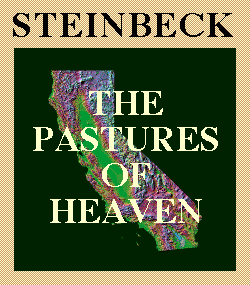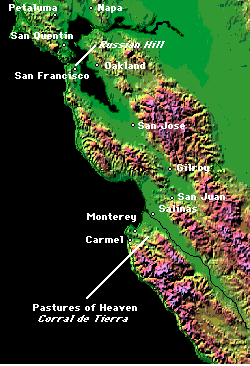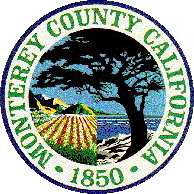
| Printing History |
|---|
|
First published in the United States of America by Robert O. Ballou, Inc. 1932 Published by Viking Penguin, Inc. 1963 First published in Penguin Books 1982 Reissued in Penguin Books 1986 Copyright John Steinbeck, 1932 Copyright renewed John Steinbeck, 1960 |
| Main Characters | ||
|---|---|---|
| 1 | a corporal | first Spaniard in Las Pasturas del Cielo |
| 2 | George Battle | first American settler of the Pastures of Heaven |
| Myrtle Cameron | epileptic wife of George Battle | |
| John Battle | their son | |
| the Mustrovics father, mother, son | squatters on the Battle farm | |
| T. B. Allen | proprietor, Pastures of Heaven General Store, schoolboard member | |
| Pat Humbert | Pastures of Heaven schoolboard member | |
| John Whiteside | Pastures of Heaven schoolboard clerk | |
| Bert Munroe | purchaser of the Battle farm, later schoolboard member | |
| Mrs. Munroe | his wife | |
| Mae Munroe | beautiful 19-year-old daughter | |
| Jimmie Munroe | handsome, randy 17-year-old son | |
| Manfred "Manny" Munroe | hysterical, dreamer, 7-year-old son | |
| 3 | Edward "Shark" Wicks | Whiteside's nextfarm "investor" neighbor |
| Katherine Hillock Wicks | his wife, works vegetable garden | |
| Alice | beautiful, stupid daughter | |
| Tom Breman | takes Katherine and Alice to a dance | |
| Mrs. Breman | his wife, friend of Katherine | |
| Miss Burke | gossip who tells on Alice and Jimmie | |
| Jack | deputy sheriff | |
| 4 | Franklin Gomez | patron of small farm |
| Poncho | Gomez' hired Mexican Indian | |
| Tularecito (Little Frog) | retarded boy found by Poncho | |
| Miss Martin | Tularecito's first teacher | |
| Mary "Molly" Morgan | Tularecito's second teacher | |
| 5 | Helen Van Deventer | woman who endures tragedy |
| Hubert Van Deventer | Helen's hunter husband of three months | |
| Hilda Van Deventer | daughter born after Hubert's death | |
| Dr. Phillips | family physician in San Francisco | |
| Joe | Helen's Filipino houseboy | |
| 6 | Junius Maltby | 35-year-old San Francisco clerk |
| Mamie Quaker | a widow in Pastures of Heaven | |
| Jakob Stutz | German hired by Maltby | |
| Robert Louis "Robbie" | son of Junius Maltby | |
| Cleo Banks | Pastures of Heaven resident | |
| Mrs. Allen | wife of T.B. | |
| Takashi Kato | third grader | |
| Mr. Kato | Takashi's father | |
| Raymond Banks | schoolboard member, big, jolly | |
| 7 | Guiermo Lopez | |
| Rosa Lopez | his daughter | |
| Maria Lopez | his daughter | |
| Allen Huenneker | ugliest, shyest man in the Valley | |
| 8 | Willa Whiteside | John's large, friendly wife |
| Joe Morgan | Molly's brother | |
| Tom Morgan | Molly's brother | |
| Mrs. Morgan | Molly's mother | |
| George Morgan | her father | |
| Bill Whiteside | their son, interested in cows | |
| 9 | Ed | warden at San Quentin |
| 11 | Richard Whiteside | Harvard educated first citizen of Pastures |
| Alicia | distant relative and wife of Richard | |
| 12 | unnamed | tour bus driver |
| unnamed | prosperous man | |
| unnamed | priest | |
| unnamed | old man | |
| unnamed | honeymoon couple | |

| Notes and Links |
|---|
| Amazon Books: Pastures of Heaven |
|
AltaVista: Steinbeck and
Pastures of Heaven ||
Corral de Tierra
Touring Car on 17-Mile Drive, 1910 Carmel Mission |

| Book Blurb — Penguin 1986 |
|---|
| A wonderful early collection of interrelated stories, rich in the feeling for the land and for its hardworking people so characteristic of Steinbeck's work. |
| In these beautifully crafted, poignant stories Steinbeck charts the gradual disintegration of a peaceful farming community in a lush California valley. As he writes of a family suddenly made to feel "poor" through the charity of a neighbor, of the wanton destruction of a retarded boy's tenuous hold on reality, and of a father jealous of suspected attentions paid to his daughter, Steinbeck movingly depicts the destructive impact of one family's insensitivity on the lives of all those around them. |
| Chapter Summary | |
|---|---|
| 1 | A Spanish corporal chasing runaway Indians rides into Las Pasturas del Cielo. Before he can return to retire an Indian woman gives him the pox and he dies locked in an old barn. After a hundred years of squatters there are twenty families, a general store, post office and, half a mile above, a schoolhouse beside a stream. |
| 2 | Draft-age George Battle comes from New York state in 1863 and sets up a farm in the middle of the valley. His mother dies off Patagonia in her way out. He marries Salinas epileptic Myrtle Cameron who bears him a son. She winds up at Lippman Sanitarium in San Jose. John inherits her epilepsy and religious mysticism. George dies at 65 and John, returned from missionarying, lets the farm go to seed while he chases demons, finally dying of a rattlesnake bite. After a ten year lapse the old Mustrovics take it over; their son works the farm, then they all mysteriously disappear. Next Monterey's Bert Munroe buys the place, builds it up, and brings his wife and three kids. Bert hopes the farm will end his string of business failures. |
| 3 | Edward "Shark" Wicks is believed to be a shrewd investor, but his investment fund is imaginary, with all purchases a and profits recorded in a ledger (e.g., South County Oil which he "buys" then "unloads" just in time). Though apparently rich, his farm is a mess and he lives poorly. He becomes obsessively protective of the his beautiful, stupid daughter Alice. While Ed is in Oakland attending his Aunt Nellie's funeral, Tom Breman takes Mrs. Wicks and Alice to a dance at the schoolhouse where a gossip informs Katherine that she has seen Jimmie Munroe and Alice kissing. When Ed returns he hears of this from storekeep Allen. He takes a gun and heads for the Munroe place. Allen alerts the neighbors and deputy sheriff. Shark is arrested and is forced to tell the judge he can't afford bail, that he's broke. Katherine comforts him by suggesting he sell the place and seek success elsewhere. |
| 4 | Riding back from a Monterey drunk, Poncho finds a strange baby which he claims talked to him. Gomez finds it and brings it to his farm. They name the misshapen and retarded boy Tularecito (little frog). He can garden and is artistic. At eleven he is forced to go to school. He covers the board with animals and, when they are erased, attacks the whole school and Miss Martin, who retires at the end of the year. Her replacement Miss Morgan encourages his art and is far more effective with the students. When she tells them of fairies and gnomes, Tularecito digs a hole at the Munroe orchard in order to meet his gnome people. Bert fills in the hole, but Tularecito digs it again after hitting Bert on the head with a shovel. He is sent to the asylum for the criminally insane in Napa. |
| 5 | Helen Van Deventer mourns her persian cat and father, marries Hubert at 25 and loses him to a hunting accident three months later leaving her rich, and six months later bears Hilda who turns out to be destructive. Dr. Phillips advises psychiatric care, but Helen decides to care for Hilda at home. Hilda has visions and tells lies. She claims to have a gold watch from an old man. At thirteen Hilda runs away to Los Angeles and Dr. Phillips again recommends treatment. Helen builds a log house in Christmas Canyon, Pastures of Heaven, and brings Hilda, a Chinese cook and a Filipino houseboy. Bert pays a call, hears Hilda screaming, but is sent away by Joe. Helen has a room full of Hubert's trophies in which she can conjure him. She feels joy, talks to a rabbit she's named Peter, calls to quail and tries to forget Hubert. After dinner she discovers Hilda missing from her room. She goes to the hunting room and takes a shotgun. The coroner decides it was suicide, Hilda with her head in a stream and shotgun beside her. Helen assures Dr. Phillips she will endure. |
| 6 | Junius Maltby clerks for ten years in San Francisco when his doctor tells him to try a warm, dry climate. In 1910 he rents a shed from the widow Quaker in Pastures of Heaven. In 1911, after recovery, Mrs. Quaker expresses concern about his living there and he marries her. She fires the hired man and nags Junius about his laziness and appearance. Poverty sits cross-legged on the farm from 1911 to 1917. In 1917 her two boys die of influenza and she dies of black fever before seeing her new baby. Through it all Junius reads Stevenson. Junius hires a German helper who never works and whom he never pays. They are failures at farming. They and the boy live in utter poverty and are outlawed by decent society. Aged six, Robbie is forced to go to school. The younger boys imitate him and visit his gentle, lazy father and get read to. He is a leader at school and impresses Mrs. Morgan in the classroom. He can read but not write; understand numbers but not arithmetic. He forms the BASSFEAJ to spy on the Japanese; they agree to stop at sundown after Mr. Kato fires a shot. The Boy Auxiliaries falls apart when Takashi applies for admission. Miss Morgan walks two miles to the Maltby place in Gato Amarillo canyon the Saturday the boys are going to save the U.S. Pres. from indians. The men and boys entertain her fully. After the schoolboard meets Mrs. Munroe gives Robbie a package of clothes which he, embarrassed, leaves behind. Miss Morgan, waiting for her bus to Salinas (and then to Los Angeles) encounters a shorn, newly-clothed Mr. Maltby taking his son to live with him in San Francisco. He hadn't known what people were saying about him. |
| 7 | Old Guiermo dies leaving his fat daughters dirt poor. They hang out a sign: TORTILLAS, ENCHILADAS, TAMALES AND SOME OTHER SPANISH COOKINGS, R. & M. LOPEZ. Business doesn't flourish. Maria rides old Lindo to Monterey to buy corn husks and a sweet for each of them. When she returns Rosa is depressed. She has given herself to a customer who ate three enchiladas and paid for them, and then she has prayed to the Virgin and Santa Rosa. Maria decides to follow that path. Their house is full of joy. Tom Breman, un hombre fuerte, visits often. They do not sell themselves, only the cookings. The women of the Valley begin to think of them as bad women. On a trip to Monterey Maria offers Allen Huenneker a ride; the Munroes see them. She returns with four candy bars and red poppy garters. Rosa, despondent, says the sheriff came by to shut down their house. They decide to become bad women in San Francisco. |
| 8 | Molly Morgan arrives in the Pastures, aged 19. She goes to the Whiteside's and Mrs. Whiteside invites her to lunch. She tells Mr. Whiteside of her early poverty. We learn of her fathers business trips and visits home with presents, the dog he brought her which she named George, how she accidentally broke his leg and Tom killed him with a hatchet. Her father suggests a Chinese funeral. The next time he leaves he doesn't return, and Mrs. Morgan says he's dead. The boys go into the Navy, Molly goes to Teachers College in San Jose (works for room and board as a servant for Mrs. Allen Morit), and Mrs. Morgan dies. Molly boards with the Whitesides. She tells the shy Bill that her father lives. On a Saturday she climbs to the outlaw Vasquez's cabin. She attends board meetings where she hears Bert tell of a drunk he's hired for hay hand. He's been everywhere and the kids all love him. He gives Manny presents. Molly tells Whiteside she must resign. |
| 9 | Raymond Banks' chicken farm. Boys come out Saturdays to watch the killing (knifing the brain) and make chicken balloons with the crops. Raymond always plays Santa Claus. His high school friend Ed, now San Quentin warden, invites him to watch hangings several times a year. The witness's excitement was the same as that of the boys. The Banks put on chicken barbecues with homemade beer for the whole Valley. Bert asks Banks to get him an invitation to a hanging. Banks drives over to tell him he can go, but Bert is afraid it will affect him and asks to pull out. He recalls the mangling of a rooster by a one-legged man when he was a boy (Bert never eats chicken). Banks goes back home and tells his wife he'll be too ill to go the hanging and that Bert's yellow. She suggests inviting Ed to their place. |
| 10 | Pat Humbert's ancient parents hated him for being young. When he was 30 his mother died and then his father. T.B. Allen invites him to dinner (he's never been out at night). "They didn't ever ask about the crops, and they hated the rain because of their rheumatism. They just wanted to live. I don't know why". He goes home after dinner and wrestles with the voices of his parents. He locks their sitting room and throws away the key. For ten years Pat drives around the valley looking for company. He gets on the school board, joins the Masons and Odd Fellows. He was 40 when the Munroes arrived. He hears Mrs. Munroe and Mae discuss his rose-covered house. He goes to the Salinas library to see what a "Vermont house" looks like on the inside. Next morning he opens the locked room and tears everything out. Every night for three months he works remodeling, always imagining Mae arriving. He orders $3,000 of furniture from San Francisco. He gets the courage to walk the quarter mile to Munroe's house, but there's a party going on. He learns from Bert that Mae is going to marry Bill Whiteside next Saturday. Pat sleeps in his barn, afraid to go in for fear of locking the room up again. |
| 11 | Richard Whiteside came to the gold fields in '50 and gave it up, arriving next at Pastures of Heaven. He saw a whirlwind omen and imagined his farm and dynasty there. He spent a year building a big house, of redwood, before planting anything. He sent to Boston for slate for the roof. He married Alicia who arranged the house perfectly and became pregnant. He purchases a small David for her. He tells her of ancient times: Herodotus, Xenophon, Thucydides. The birth was rough; Alicia can't have another child. He agrees to christen the baby John (her father) rather than David. Five years later she became pregnant again and lost the child after six months and an agonizing delivery. At ten he tells John the bible is a very incomplete record of an obscure people, compared to the three Greeks' books. He dies of pneumonia before John can return from Harvard. Six years later John married Willa, the sister of a classmate. John and Willa enjoyed their neighbors. Willa conceived in their eighth year together. Bill, aged ten, shows no interest in the Greeks. When Bert Munroe arrived he enjoys Thucydides and borrows it. Bill announces he's going to marry Mae Munroe. She wants to live in Monterey. Bert and Jimmie help John burn off some brush, but a whirlwind carries a spark into the coal oil at the house and burns it down. John and Willa will move into town with Bill. |
| 12 | A tour bus takes 17 mile drive to Carmel Mission then up to the rim of Pastures of Heaven. A businessman dreams of developing it. A young man dreams, to his new wife, of settling there; but she brings him back to reality. A priest who wishes he could reside there thinks he may when he's dead. An old man wishes he could stay there and have time to think. |
| Stephan | Steinbeck |
|---|